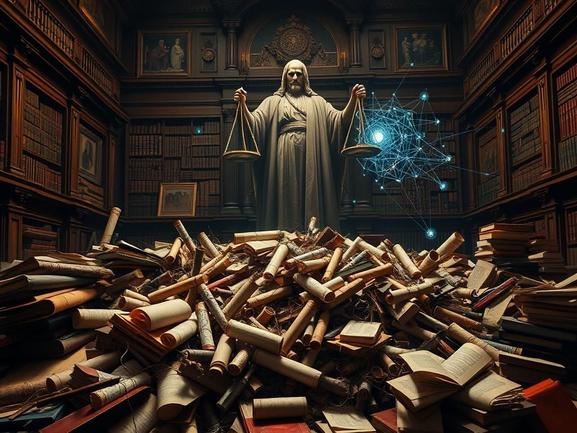The burgeoning field of artificial intelligence continues to push boundaries, not just in technological capability, but also in legal and ethical considerations. A recent court decision involving AI firm Anthropic has thrown a spotlight on the complex interplay between AI development and intellectual property rights, particularly copyright. While the ruling offered a nuanced perspective on the legality of using copyrighted works for AI training, it also underscored a critical vulnerability for AI companies: the source and legitimacy of their training data. This case, viewed by many as a bellwether for the industry, highlights the urgent need for clarity and responsible practices as AI systems increasingly rely on vast troves of human-created content.
Authors vs. Algorithms: The Core Conflict
At the heart of the matter are allegations brought forth by a group of authors who contend that Anthropic’s methods represent a profound violation of their creative rights. Their lawsuit paints a picture of large-scale appropriation, suggesting that the company’s AI models were built by essentially “strip-mining” the expression and ingenuity embedded within countless literary works. From the creators’ viewpoint, leveraging their copyrighted material without explicit permission or compensation amounts to exploiting their labor and creativity for commercial gain. This perspective frames the AI development process not as innovation built upon existing knowledge, but as unauthorized extraction that undermines the very foundation of creative professions. The authors’ grievances articulate a fear shared by many in creative fields: that the rapid advancement of AI could devalue human artistry and expression by freely consuming and repurposing it.
A Judge’s Distinction: Training vs. Piracy
The court’s decision introduced a crucial distinction that could shape future litigation. The ruling indicated that the act of training an AI model itself on copyrighted material, in a broad sense, might be viewed differently under copyright law – potentially falling under transformative use, a concept allowing limited use of copyrighted material without permission for purposes like commentary, criticism, news reporting, research, teaching, or scholarship. However, the same ruling drew a firm line when it came to the source of that material. Specifically, the judge determined that there is no legal justification for an AI company to utilize pirated copies of copyrighted works for its central training datasets. This distinction is pivotal. While the general principle of training on copyrighted data remains a complex and debated area, the use of illegally obtained material is unequivocally problematic and constitutes a clear legal exposure. It signals that even if the *act* of training is deemed permissible, the *means* by which the data is acquired is subject to strict legal scrutiny.
The Unavoidable Question of Data Sourcing
The court’s insistence that using pirated copies is indefensible shines a harsh light on the data pipelines that fuel today’s powerful AI models. Training large language models requires colossal amounts of text, often scraped from the internet. Verifying the copyright status and legality of every piece of data in a multi-terabyte dataset is an monumental, perhaps near-impossible, task. Yet, this ruling implies that AI companies cannot simply turn a blind eye to the provenance of their data. The fact that the case will proceed to trial specifically on the piracy claims underscores the legal system’s view that benefiting from illegally distributed content is unacceptable. This poses a significant challenge for the AI industry, forcing developers to confront the ethical and legal complexities of data acquisition and potentially invest heavily in methods to curate and verify their training corpuses, or face substantial legal repercussions and damage to their reputation.
Implications for the AI Landscape and Beyond
This ruling carries considerable weight beyond just Anthropic. It could establish a precedent influencing numerous other high-profile lawsuits pending against major AI players like OpenAI and Meta Platforms, which face similar allegations regarding their training data. The decision suggests that while the broad concept of AI training might find some legal protection, reliance on pirated or unverified data sources is a significant liability. For companies that have marketed themselves on principles of responsibility and safety, like Anthropic, facing a trial based on the alleged use of pirated materials presents a challenge to their carefully constructed image. More broadly, this case is a flashpoint in the ongoing global conversation about how to balance rapid technological advancement with the protection of creators’ rights and existing legal frameworks. It highlights the need for clearer guidelines, and perhaps new legal paradigms, to govern the relationship between AI and the wealth of human knowledge it consumes.
The path forward requires careful navigation, balancing the immense potential of AI with the fundamental rights of those whose creativity makes such potential possible. This lawsuit, even in its preliminary stages, serves as a potent reminder that the foundation upon which AI is built must be ethically sound and legally compliant. The outcome of the trial on the piracy claims will undoubtedly send further ripples through the industry, influencing how AI developers source data and how creators protect their work in the age of intelligent machines. The dialogue between technologists, legal experts, creators, and policymakers is more crucial than ever to forge a sustainable and equitable future where innovation and intellectual property can coexist.
